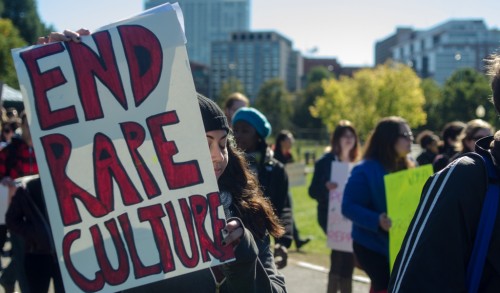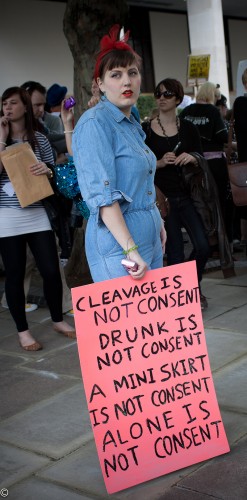
As the discussion on what it means to consent has gained popularity on college campuses, advocates push to bring the topic to a younger audience
One in five women in college are sexually assaulted. It’s a statistic that college students — especially those who are young women — hear repeatedly and, perhaps, have become desensitized to by now.
Enter conversations about consent on college campuses.
There’s the popular tagline of “consent is sexy” as a misleading attempt to combat the prevalence of sexual assault on college campuses. There’s also the “yes means yes” movement advocating for consent at the forefront of all sexual relationships.
But why do conversations about consent happen as late as college? By the time young adults have their first encounter with the idea of consent, the discussion is already too little, too late.
According to the U.S. Bureau of Justice Statistics, 44 percent of sexual assault and rape victims are under 18 years old, with 29 percent between the ages of 12 and 17. High school-aged women, from 16 to 19 years old, are four times more likely than the general population to be victims of rape, attempted rape or sexual assault.
Modern-day sex education fails to identify how rape, consent and sexual relationships intersect. Not knowing the definition of one means not knowing the full definition of another. Healthy sexual relationships require consent, and lack of consent means rape.

What is Consent?
At its core, consent requires communication.
DePaul’s Policies and Procedures Manual defines consent as an “unambiguous and voluntary agreement to move forward with a specific sexual request, act or experience,” meaning that it is “an affirmative act, not a lack of action.”
Consent, however, isn’t restricted to difficult-to-read jargon. It’s actually a “simple” action according to Anna Nettie Hanson, DePaul senior and author of “For Now: Words of the Girl Who Fought Back,” a novel about her experiences as a rape survivor.
“Active agreement. Active permission. Key word: active,” Hanson said. “Campaigns don’t need to advertise that ‘consent is sexy’ — consent is simply required. People must understand the basic idea that ‘yes means yes,’ and that the ‘yes’ must be completely voluntary.”
YouTube star and sex education activist Laci Green listed five criteria of what constitutes as consent at her “Taking Down Rape Culture” event at DePaul on Monday: a verbal yes, an enthusiastic agreement, freely given (not pressured) permission, ongoing with regular check-ins and sober (if someone is too drunk to drive, they cannot consent to sex).
Consent, in other words, goes beyond a one-time “yes” — it’s an active, continuous, open conversation.
The Inefficiency of Sex Education
The Guttmacher Institute found that 20 states and the District of Columbia mandate both sex and HIV education, with one state mandating sex education alone and another 13 states mandating HIV education. Although it’s already frustrating enough that sex education in classrooms isn’t a nationwide requirement, an often overlooked fact is how sex education programs only focus on the risks and dangers of sexual activity — but not on sexual relationships themselves.
While it is important and necessary for sex education to talk about pregnancy and sexually transmitted infections/diseases, a large part of sexual health takes into consideration the relationship between parties engaging in sexual activity.
“Sex is a taboo subject, so of course discussion on how to agree to sexual activity is seen as a highly sensitive subject,” Hanson said.
Hanson first came across the idea of consent after graduating from high school, which she said is “not something unique” to her.
“After being sexually assaulted at 18, my high school then revamped the sexual education classes to explicitly discuss consent,” Hanson said.“While happy that the change was made, it was a bitter reminder that these discussions were not previously taking place … Starting discussions of consent in college? That’s too late.”
In and out of the classroom, most sources of sex education accessible to adolescents — especially through the media — are deeply gendered. Research published by the Women and Health Journal in 2005 notes that “boys’ sexuality is generally overtly linked with pleasure, for example, the insistence of the male sex drive, wet dreams and orgasm in the context of reproduction” while “sex education associates female sexuality primarily with reproduction, or presents females solely as victims of coercion.”
Thus, modern-day sex education discourages women from taking agency in sexual relationships. The inclusion of consent into sex education would give way to a more equal playing field for all genders in sexual relationships.
Misconceptions Surrounding Rape
The sooner consent is understood, the sooner people will realize rape does not only happen with strangers.
The Bureau of Justice Statistics found that in rape and sexual assault cases for female individuals ages 18 to 24 in and out of college, 80 percent knew the perpetrator.
Even in spousal relationships, one study found that husbands, common-law partners or boyfriends committed 30 percent of adult rape cases.
Hanson’s experiences as a rape survivor involve the trauma of being sexually assaulted by someone she thought was a friend.
“Consent is not vulgar, so society must stop treating it as such,” Hanson said. “Mutual respect and personal boundaries are important aspects of human interaction, and consent is a simple extension of this education.”
Despite the statistics out there, we have yet to realize how silencing conversations about consent early on prevents more people from identifying different forms of sexual violence.
Rape as a Decision by the Perpetrator
“We need to start thinking of rape as a decision to violate someone else,” Green said at her DePaul event Monday. “It is about power and control.”
More direct conversations about consent would lead to healthier sexual relationships consisting of communication and respect.
Sex education in the U.S. has failed us by making the expectation of college-aged women being raped a norm in society.
Leaving consent out of students’ earliest memories of sex education only makes it more difficult for society to progress beyond rape culture.
Until consent is acknowledged as a necessary part of mainstream dialogue, occurrences of sexual assault will not slow down anytime soon.
Ultimately, a conversation surrounding consent is long overdue and one that we desperately need to have as a society.








Robert Riversong • Apr 27, 2015 at 1:05 pm
“One in five women in college are sexually assaulted.”
As long as such myths are propagated, there can be no rational response to the problem of non-consensual sexual activity (I won’t use the term “sexual assault” because it’s been so watered down as to be meaningless, including such abominations as an unwanted kiss),
Only in failed states suffering from on-going warfare are rates of sexual assault as high as 20%. We know from the 2014 18-year DOJ study that the actual rate of sexual assault on campus is 0.6% per year and of the rate of campus rape is 0.2% annually.
“It is about power and control.”
We also know, from many studies, that even criminal rapists have no preference for rape over consensual sex, that their goal is sexual fulfillment not power, and this is exponentially more true for college students.
“if someone is too drunk to drive, they cannot consent to sex”
State laws are explicit that only incapacitation, and not mere drunkenness, is sufficient grounds to mitigate sexual consent. Outlawing drunken sex would criminalize much normal sexual behavior, particularly among young adults who rely on alcohol to reduce inhibitions.
So, first, we must dispense with the mythologizing and propaganda, and only then can we have a rational conversation about sexual consent.
However, consent to a human interaction as psychologically, physiologically and emotionally loaded as sexual intercourse, can never be as simple as a business contract (and arguably never should be). It requires mutual and self-respect, not a constantly re-negotiated contract.